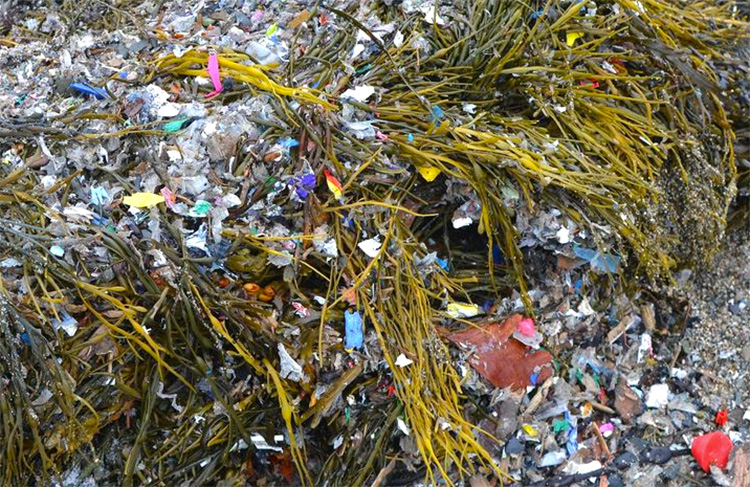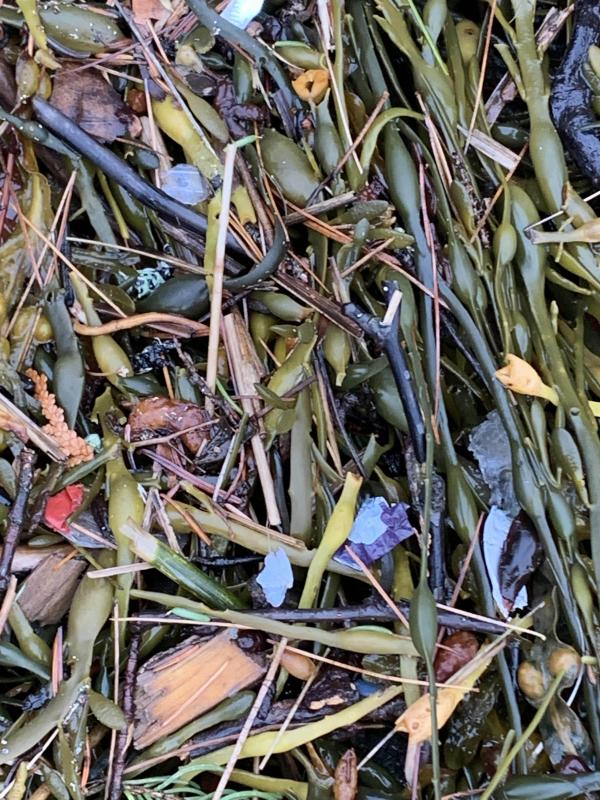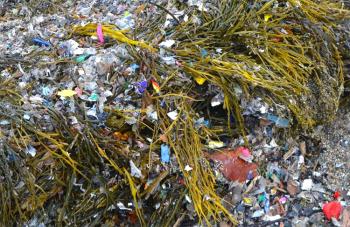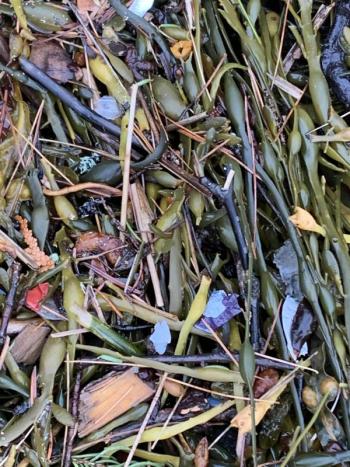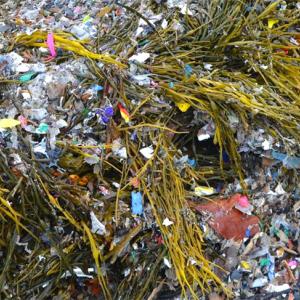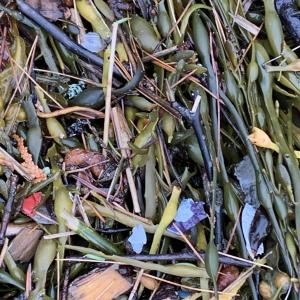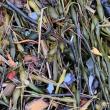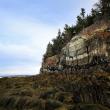Islesboro Select Board, Land Trust send strong message to state over two-ton trash spill in Penobscot Bay
ISLESBORO — In a Jan. 8 joint announcement, the chair of the Islesboro Select Board, Gabe Pendleton, and the executive director of the Islesboro Islands Trust, Steve Miller, expressed dismay about the recent spill of baled — mostly plastic — trash into waters of Penobscot Bay, and demanded action by the Maine Dept. of Environmental Protection.
The Select Board and land trust are urging, “serious sanctions for the accidental but preventable discharge of more than two tons of plastic waste at Mack Point, Searsport,” according to Miller, in a news release.
The DEP said in early December that it was investigating the compacted trash from Ireland that spilled into Penobscot Bay waters while being unloaded from a ocean freighter. A report or enforcement action has yet to be issued.
The Islesboro Select Board also strongly recommended enactment of policies to prevent plastics discharge to all Maine waters, including Penobscot Bay, in the future, he said.
On Jan. 3, the Islesboro Islands Trust sent a letter to Brian Kavanah, who is the director of the DEP’s Bureau of Water Quality, advising zero tolerance, “ for this kind of preventable dumping into the marine waters.”
Additionally, the Select Board is also submitting a letter to the DEP, which said, in part, "We are especially concerned about this serious water quality threat to our local economy."
(Read the attached PDF for the entire two letters)
“Sprague Operating Resources must be sanctioned for not immediately reporting the above cited plastics discharge; protocols must be developed that ensure thorough, rapid and effective clean-up of any such waste spill in future; and waste transportation regulations must be imposed that represent zero tolerance for discharge of plastics into Maine waters,” the IIT letter said. (See below for full letter)
Pendleton agreed to send the Islesboro Select Board letter, with copies of the IIT letter, to other municipalities in the Penobscot Bay region and apprise them of their concerns.
"Please undertake all steps necessary to discipline the responsible parties and establish zero tolerance for discharging plastic waste into the marine waters of Maine," the Select Board wrote.
Islesboro Islands Trust listed 12 specific concerns related to the discharge of waste plastics in Penobscot Bay.
The IIT letter reminded the Maine DEP that, “Plastics in our bay are unacceptable in all cases but this was preventable, should have been reported immediately, should have been attended to more thoroughly and effectively and should cause officials to take steps to prevent this from happening again.”
Miller said an increasing body of research clearly demonstrates that microplastics pose a serious health risk to marine life and humans who eat seafood.
“Maine DEP needs to send an unambiguous message that discharges of waste plastics into marine waters is an unacceptable health hazard,” Miller said.
Islesboro Islands Trust letter
Dear Mr. Kavanah:
Islesboro Islands Trust (IIT) advances land conservation, ecosystem education and environmental advocacy in the Penobscot Watershed. For more than 30 years, IIT’s education, advocacy, water quality monitoring, and research demonstrate particular interest in the quality and integrity of water throughout the watershed. IIT advocates for the extremely important Penobscot Bay marine economy. Sprague Operating Resources at Mack Point, Searsport, must be held accountable for the accidental but preventable discharge of more than 2 tons of plastic waste into Penobscot Bay and a policy of zero tolerance for plastic discharge into Maine waters must be adopted.
Plastics in our bay are unacceptable in all cases but this was preventable, should have been reported immediately, should have been attended to more thoroughly and effectively and should cause officials to take steps to prevent this from happening again.
Concerns include:
- Although the discharge of more than 2 tons of plastic into Penobscot Bay apparently occurred on December 2, Sprague Operating Resources, responsible for the spill, did not report the incident. The plastics were reported to your Bureau first on December 8 by a Stockton Springs resident walking on Sears Island and again on December 13 by an Islesboro resident walking on Sprague’s Cove, Islesboro.
- The plastic pieces found on Sears Island and Islesboro indicated that one or more bales came apart and allowed dispersal through Penobscot Bay.
- Volunteers that rallied to assist in the clean-up effort acknowledged the incredible inefficiency of hand-picking thousands of small plastic pieces entangled in seaweed and beach gravel, suggesting that this approach cannot reasonably be expected to retrieve all of the pieces even as tides and wave action continue to move pieces.
- This timeline of events introduces considerable uncertainty as to how much of the spilled plastic has been and can be removed and how much still circulates in the bay.
- Bigelow Laboratory for Ocean Sciences released a research report in July 2020 showing “that microplastic fiber pollution impacts larval lobsters at each stage of their development,” potentially leading to death of larvae and posing health consequences for all stages of lobster as well as for human who consume them.
- The Shaw Institute in Blue Hill in 2014 found “surprisingly large numbers of microplastic fragments in oysters and mussels... These numbers show microplastics may pose a serious health threat to the animals themselves and seafood consumers.”
- Fisheries, including but not limited to lobster and mussels, are a significant component of the Penobscot Bay region’s economy.
- The federal EPA’s Trash Free Waters initiative highlights several aquatic trash problems, including “possible human health risks of ingesting microplastics through fish we eat.”
- According to Maine Title 38, Section 420, “No person, firm, corporation or other legal entity shall place, deposit, discharge or spill, directly or indirectly, into the ground water, inland surface waters or tidal waters of this State... any toxic substance... [including] substances or combination of substances, including disease-causing agents, that after discharge or upon exposure, ingestion, inhalation or assimilation into any organism, including humans either directly through the environment or indirectly through ingestion through food chains, will, on the basis of information available to the department either alone or in combination with other substances already in the receiving waters or the discharge, cause death, disease, abnormalities, cancer, genetic mutations, physiological malfunctions, including malfunctions in reproduction, or physical deformations in such organism or its offspring.”
- Federal law controlling the “dumping of material transported from outside the United States into the U.S. territorial sea” and portions of the Clean Water Act “regulating discharges of pollutants into the waters of the United States” suggest that spilling plastic waste as occurred at Mack Point, Searsport, on or about December 2 violates key findings of law meant to protect our marine environment.
- While the measurable effect of this specific discharge into Penobscot Bay on water quality and fisheries may not be known for some time, the impact on public perception of the quality of Penobscot Bay lobsters, mussels and other species could be economically devastating, especially following recent shellfish closures in the region due to historical HoltraChem mercury discharges still present.
- Delivery of a similar or the same kind of plastic material in 2019 apparently shipped in containers, which would prevent discharge of plastic pieces in the event of an offloading mishap. How bales of plastic destined as fuel are wrapped, stored and transported also affect the outcome of potential spills.
Penobscot Bay is a vibrant estuarine environment for a host of species of interest, including large numbers of lobsters and improving numbers of Atlantic Salmon, and important quantities of Sturgeon, Alewives, ten anadromous fish species native to the Penobscot watershed, clams, mussels, scallops, shrimp, crabs, cod, haddock, flounder, mackerel and more.
Evidence supports success of the Penobscot River Restoration project. Up in the Penobscot watershed, discharge regulations, in recent years, helped sustain upgrades in water classifications. Court-ordered clean-up of the horrendous mercury discharges from the former HoltraChem plant appears poised for remediation. Research suggests that the Bay near Mack Point is an area of high lobster settlement and points to the importance of a healthy co‐evolved diadromous complex in sustaining healthy ecosystem structure and function.
Therefore, it is essential that DEP protect the maritime environment in this area.
Sprague Operating Resources must be sanctioned for not immediately reporting the above cited plastics discharge; protocols must be developed that ensure thorough, rapid and effective clean-up of any such waste spill in future; and waste transportation regulations must be imposed that represent zero tolerance for discharge of plastics into Maine waters.
Thank you for your time.
Reach Editorial Director Lynda Clancy at lyndaclancy@penbaypilot.com; 207-706-6657
Event Date
Address
United States

